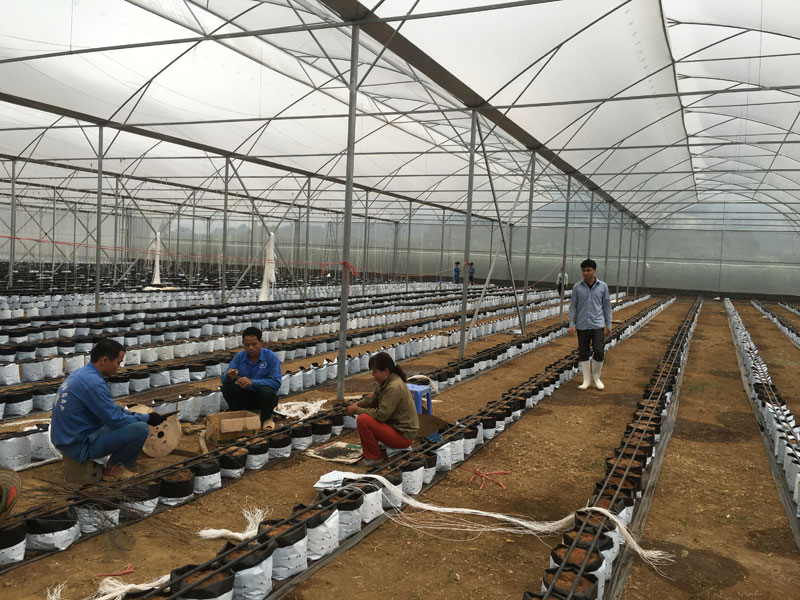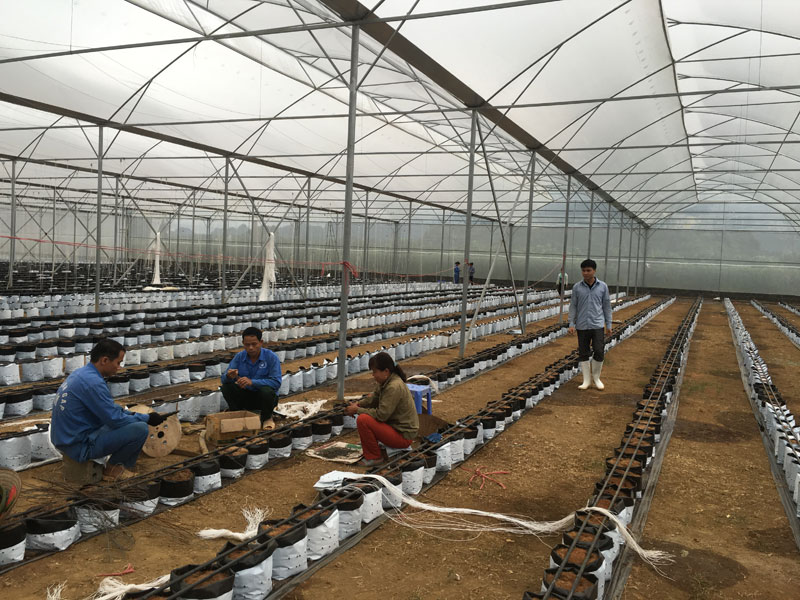
(HBO) – The birth of the Hoa Binh GAP Co. Ltd in Thanh Ha town, Lac Thuy district has brought the local agriculture to a turning point - hi-tech production. The company, operational in early 2017, has so far created dozens of jobs.

Hoa Binh GAP Co. Ltd completes
a 10,000-m2 greenhouse system to kick off production in 2018.
Previously, head of the
company Pham Tien Sinh had spent one year preparing a greenhouse system and
production infrastructure in line with Israeli standards. According to Sinh,
greenhouse cultivation helps shield plants from harsh weather and diseases, and
farmers can make decisions on nutrition, thus turning out safe and
pesticide-free farm produce. Of total five hectares of land, the company has
invested 3.2 billion VND in a 5,000-m2 greenhouse area in the first phase. In
2017, it grew the first crop of cucumbers, which was sold for 20,000 VND per kg
and reeled in 360 million VND in total.
Kim Hoang Hau melon was
selected for the second crop. The fruit was produced following the GAP standard
with flawless look. The crop produced four tonnes of melons and total revenue
hit 200 million VND.
The company continued with
the cultivation of cantaloupe, a favourite fruit of consumers now. With the
growing area doubling, the business earned 400 million VND from 8 tonnes of cantaloupe.
In the fourth crop, the
company combined cantaloupe and Kim Hoang Hau melon, harvesting a total of
eight tonnes for 400 million VND in revenue.
In December, Hoa Binh GAP
plans to stop cultivation and start investing in the second phase with the
construction of another 5,000-m2 greenhouse area. In January 2018, production
of cantaloupe and Kim Hoang Yen melon will be resumed across the entire
10,000-m2 greenhouse complex, serving demand during the Lunar New Year holiday.
Sinh said it would take 2.5 – 3 years for his company to make a profit, but the
model is sustainable and caters to the market demand for clean farm produce.
Ngo Dinh Tam, head of the
Lac Thuy Agriculture and Rural Development Division, said this is the first
hi-tech farming model in the district and is a development way that Lac Thuy is
heading to.
Hoa Binh GAP now provides jobs
for 10 residents, with monthly wage raging between 5 and 10 million VND. The
company plans to complete its greenhouse system on the remaining 4 hectares in
2019 to grow organic vegetables./.
According to data from the Hoa Binh Provincial Party Committee, the industrial production index for the first six months of 2025 is estimated to have increased by 20% compared to the same period last year. This marks the highest year-on-year growth rate for this period since 2020.
In the first six months of 2025, Hoa Binh province’s export turnover was estimated at 1.145 billion USD, marking an 18.11% increase compared to the same period in 2024. Import turnover was estimated at $ 804 million, a 17.15% increase, which helped the province maintain a positive trade balance.
The lives of the ethnic minority farmers in Tan Lac district have gradually improved thanks to the new directions in agricultural production. This is a testament to the collective strength fostered through the professional associations and groups implemented by various levels of the district’s Farmers’ Union.
With the motto the "product quality comes first,” after nearly one year of establishment and operation, Muong village’s Clean Food Agricultural and Commercial Cooperative, located in Cau Hamlet, Hung Son Commune (Kim Boi district), has launched reputable, high-quality agricultural products to the market that are well-received by consumers. The products such as Muong village’s pork sausage, salt-cured chicken, and salt-cured pork hocks have gradually carved out a place in the market and they are on the path to obtaining the OCOP certification.
In the past, the phrase "bumper harvest, rock-bottom prices" was a familiar refrain for Vietnamese farmers engaged in fragmented, small-scale agriculture. But today, a new spirit is emerging across rural areas of Hoa Binh province - one of collaboration, organisation, and collective economic models that provide a stable foundation for production.
Maintaining growing area codes and packing facility codes in accordance with regulations is a mandatory requirement for agricultural products to be eligible for export. Recently, the Department of Agriculture and Environment of Hoa Binh province has intensified technical supervision of designated farming areas and packing facilities to safeguard the "green passport" that enables its products to access international markets.



